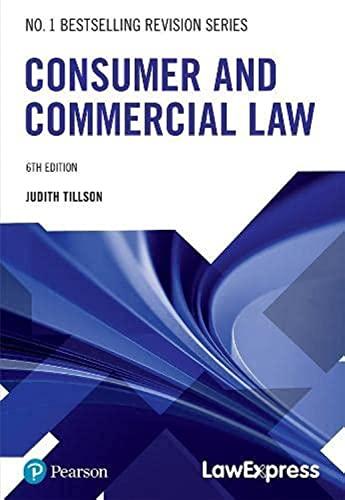Question
Ransburg v. Richards - Was the exculpatory clause valid? QUESTION: Was the exculpatory clause valid? ANSWER: MUST BE 16 lines minimum. FACTS ABOUT THE CASE:
Ransburg v. Richards - Was the exculpatory clause valid?
QUESTION: Was the exculpatory clause valid?
ANSWER: MUST BE 16 lines minimum.
FACTS ABOUT THE CASE:
Ransburg v. Richards770 N.E.2d 393 Indiana Court of Appeals, 2002
Barbara Richards leased an apartment at Twin Lakes, a complex owned by Lenna Ransburg. The written lease declared that: Twin Lakes would "gratuitously" maintain the common areas. Richards's use of the facilities would be "at her own risk." Twin Lakes was not responsible for any harm to the tenant or her guests, anywhere on the property (including the parking lot), even if the damage was caused by Twin Lakes' negligence. It snowed. As Richards walked across the parking lot to her car, she slipped and fell on snow-covered ice. Richards sued Ransburg, who moved for summary judgment based on the exculpatory clause. The trial court denied Ransburg's motion, and she appealed.
Argument for Tenant
An exculpatory clause in a contract for an essential service violates public policy. When an ill person seeks medical care, his doctor cannot require him to sign an exculpatory clause. In the same way, a person has to live somewhere. Her landlord cannot force her to sign a waiver. Landlords tend to be wealthy and powerful. There is generally no equality of bargaining power between them. The tenants are not freely agreeing to the exculpatory language.Moreover, if a landlord fails to maintain property, not just the tenant is at risk. Visitors, the mail carrier, and the general public could all walk through the Twin Lakes parking lot. The public's interest is served when landlords maintain their properties. They must be held liable when they negligently fail to maintain common areas and injuries result.
Argument for Landlord
Ms. Richards does indeed have to live somewhere, but she does not have to live on the plaintiff's property. Surely there are many dozens of properties nearby. If Richards had been dissatisfied with any part of the proposed leaseexcessive rent, strict rules, or an exculpatory clauseshe was free to take her business to another landlord. Landlords may generally be wealthier than their tenants, but that fact alone does not mean that a landlord is so powerful that leases are offered on a "take it or leave it" basis. Here, the landlord stated the exculpatory clause plainly. This is a clear contract between adults, and it should stand in its entirety.
Ransburg v. Richards770 N.E.2d 393 Indiana Court of Appeals, 2002
Ransburg v. Richards - Was the exculpatory clause valid?
QUESTION: Was the exculpatory clause valid?
ANSWER: MUST BE 16 lines minimum.
Step by Step Solution
There are 3 Steps involved in it
Step: 1

Get Instant Access to Expert-Tailored Solutions
See step-by-step solutions with expert insights and AI powered tools for academic success
Step: 2

Step: 3

Ace Your Homework with AI
Get the answers you need in no time with our AI-driven, step-by-step assistance
Get Started


